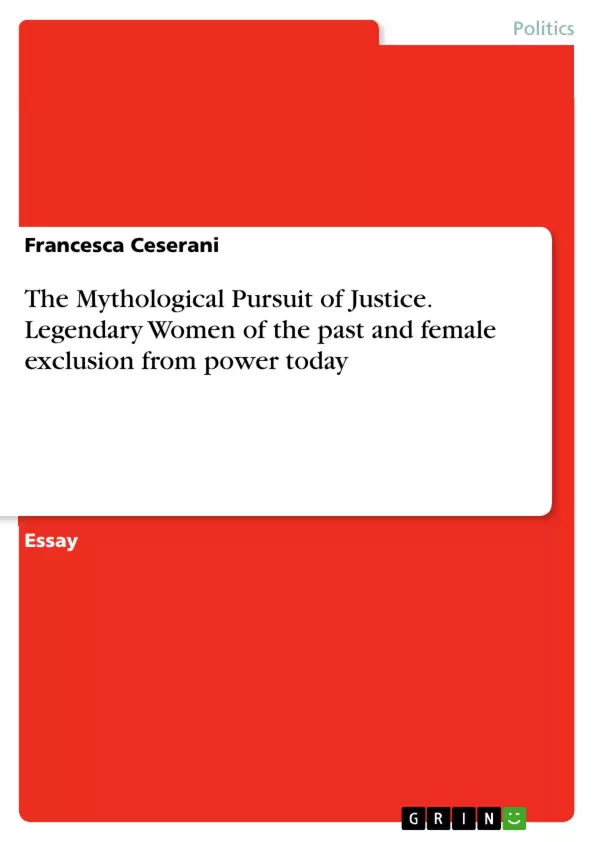This research endeavours to explain that the stories of legendary women of the past should not be neglected, since they provide valid examples that clarify the reasons for female exclusion from power. Moreover, it is therefore also natural to wonder why their femininity was ripped away from them. Antigone, Clytemnestra and Medea are criminals, and their outrageous actions go against natural and positive law. They are not women. Furthermore, in order to give them back their womanhood, they must be disempowered. Further reflections will seek to find answers to the main question of the research: how can their stories contribute to explain women’s exclusion from power today?
History demonstrated to be the theatre of the oppressed, the stage in which the characters have proved to excel in abusing and taking advantage of the losers of the game, the oppressed. Among them lie women, who have certainly always been kept in the back row during men’s performance. More specifically, women were and are still taken away from the power, a matter that has ultimately been reserved exclusively for manhood.
Inhaltsverzeichnis (Table of Contents)
- Introduction
- Hegel's Sittlichkeit and Bachofen's maternal law: Antigone
- Clytemnestra and Medea's fury: against natural law for justice
Zielsetzung und Themenschwerpunkte (Objectives and Key Themes)
This research endeavors to explore the stories of legendary women from the past, particularly Antigone, Medea, and Clytemnestra, and their pursuit of justice in a misogynistic society. The primary objective is to understand how these narratives can shed light on the exclusion of women from power in the modern world. Through an analysis of these myths, the essay aims to uncover the underlying reasons for female subjugation and the historical factors that contribute to their disempowerment.
- The clash between natural law and positive law
- The representation of women as monstrous or criminal figures
- The concept of maternal law and its connection to female agency
- The relationship between power, gender, and justice
- The significance of myth and symbolism in understanding female experiences
Zusammenfassung der Kapitel (Chapter Summaries)
- The introduction sets the stage for the research by exploring the themes of women's exclusion from power and the pursuit of justice through mythology. It introduces the key figures of Antigone, Medea, and Clytemnestra and emphasizes their significance in understanding the complexities of female experiences.
- The second chapter focuses on Antigone's pursuit of justice in Sophocles' play. The chapter analyzes her rebellion against Creon's law, highlighting the clash between patriarchal and maternal law. It examines Hegel's concept of Sittlichkeit and Bachofen's maternal law in relation to Antigone's actions and the enduring significance of chthonic justice.
- The third chapter examines the stories of Clytemnestra and Medea, showcasing their acts of vengeance against patriarchal oppression. The chapter explores their portrayal as monstrous figures and analyzes their rebellion against natural law, highlighting the complexities of their female identities and the implications of their actions.
Schlüsselwörter (Keywords)
The key terms and concepts explored in this research include: natural law, positive law, maternal law, Sittlichkeit, chthonic justice, patriarchal society, female agency, power, gender, justice, myth, symbolism, Antigone, Medea, Clytemnestra, Sophocles, Euripides, Aeschylus.
Frequently Asked Questions
Why are Antigone, Clytemnestra, and Medea significant?
These legendary women represent early examples of female rebellion against patriarchal power and the pursuit of justice under difficult circumstances.
What is the conflict between natural and positive law?
Natural law refers to inherent moral rights (often linked to family/maternal law), while positive law is the man-made law of the state (often patriarchal).
How does mythology explain female exclusion from power today?
The research argues that historical narratives portraying powerful women as "monstrous" or "criminals" have set a precedent for excluding women from power structures.
What is Hegel's concept of 'Sittlichkeit' in this context?
It refers to the ethical life and social order, which in Antigone's case, highlights the tension between family duties and state obligations.
What is 'maternal law'?
Maternal law (or Bachofen's theory) suggests an ancient social order based on female lineage and chthonic justice, which was later suppressed by patriarchy.
- Citation du texte
- Francesca Ceserani (Auteur), 2019, The Mythological Pursuit of Justice. Legendary Women of the past and female exclusion from power today, Munich, GRIN Verlag, https://www.grin.com/document/584843



